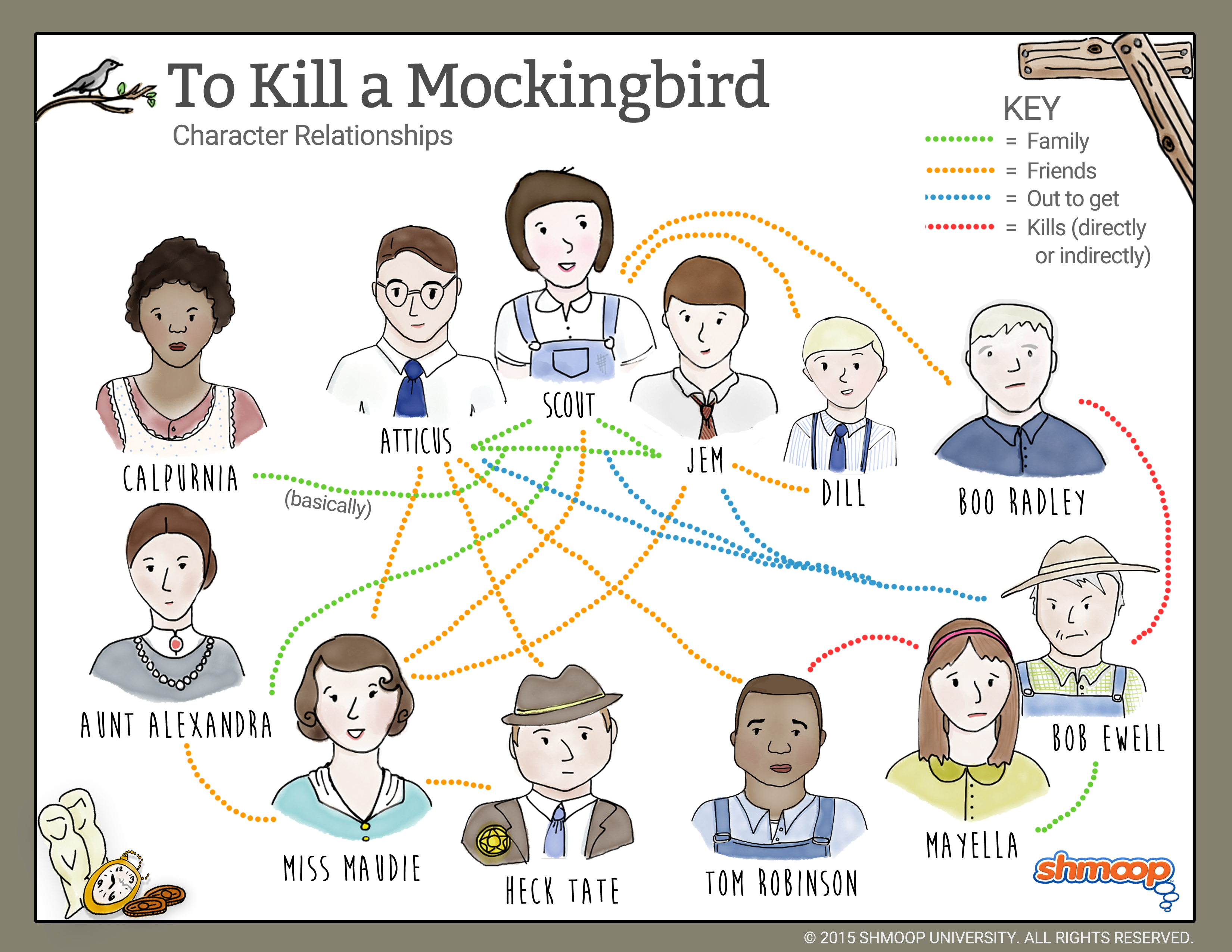Tools of Characterization
Character Analysis
 (Click the relationships infographic to download.)
(Click the relationships infographic to download.)
Actions
While characters may say all kinds of things, it’s what they do that shows what they’re really made of. Example: Atticus says that Mr. Underwood "despises Negroes, won't have one near him" (16.5), but when a lynch mob threatens both Tom and Atticus, Mr. Underwood is waiting with his shotgun to defend them. And after Tom’s death, Mr. Underwood’s editorial in The Maycomb Tribune takes a much stronger stance in Tom’s favor than most Maycomb citizens are willing to hold to.
Direct Characterization
The novel often sums up its characters in a few words: Miss Stephanie Crawford is "a neighborhood scold" (1.50), Boo Radley is "a malevolent phantom" (1.43), and Mrs. Dubose is "plain hell" (1.14). While these capsule descriptions are sometimes accurate, most of them become more complex and nuanced through the other "Tools of Characterization" as the book progresses, suggesting that people are rarely as simple as they might seem at first.
Family Life
Aunt Alexandra believes each family has a "streak" (13.26), but characters’ home lives do just as much to show what they’re like. When Scout says to Miss Maudie, "Atticus don't ever do anything to Jem and me in the house that he don't do in the yard" (5.53), it tells us that Atticus cares more about actually doing right than just making people believe that he does so. The image that Atticus builds up at Tom’s trial of Mayella’s depressing home life tells the reader as well as the jury that she’s terribly lonely, and might latch on to anyone who shows her a moment’s kindness. And part of the mystery of Boo is wondering about how he lives at home: whether his house is a sanctuary or a prison, and whether his family is his protectors or his jailors.
Location
The first warning bell that signals to Scout that she and Miss Caroline might have some difficulty communicating is that the teacher is from North Alabama, on the other side of the state from Maycomb. Even within Maycomb, where a character lives tells you something about them (for a different take on Maycomb’s geography, see "Setting"). The Ewells don’t live by the dump just because it’s cheap, but because they’re Trash. The Cunninghams out in the woods are on the fringes of Maycomb society as well as geography, and live a self-sufficient existence that doesn’t have much to do with the town itself. (And the Cunningham’s settlement, Old Sarum, shares its name with an early English village, suggesting that they look more to the past than the future.)
Speech and Dialogue
How a character talks can often tell you more than what they say. In racially-divided Maycomb, one word in particular is a marker of where a character stands: "n*****."
The word first appears in the text when Scout echoes something Calpurnia said, showing from the start that its usage is more complicated that just a nasty way for whites to put down African-Americans: Calpurnia isn’t looking forward to hip-hop and reclaiming the word, but using it to talk about a particular kind of African-American person. Calpurnia uses the term again when she’s addressing Lula, showing it has power as an insult even within Maycomb’s African-American community. Calpurnia’s use of the word suggests her sense of difference from that community (what Scout calls her "double life" [12.138]), but also raises questions about attitudes towards race among African-Americans in Maycomb that the novel doesn’t really address.
Atticus never uses the word "n*****," except when he’s explaining to Scout why she shouldn’t say it, or why she shouldn’t get into fights when other people call Atticus a "n*****-lover."
"Scout," said Atticus, "n*****-lover is just one of those terms that don't mean anything – like snot-nose. It's hard to explain – ignorant, trashy people use it when they think somebody's favoring Negroes over and above themselves. It's slipped into usage with some people like ourselves, when they want a common, ugly term to label somebody." (11.107)
Is Atticus right? Does the term really have no meaning except as a way to put others down? Whether the answer to these questions is yes or no, the common usage of "n*****" in the text speaks not only to the attributes of individual characters, but also of the norms of the community in which they live.